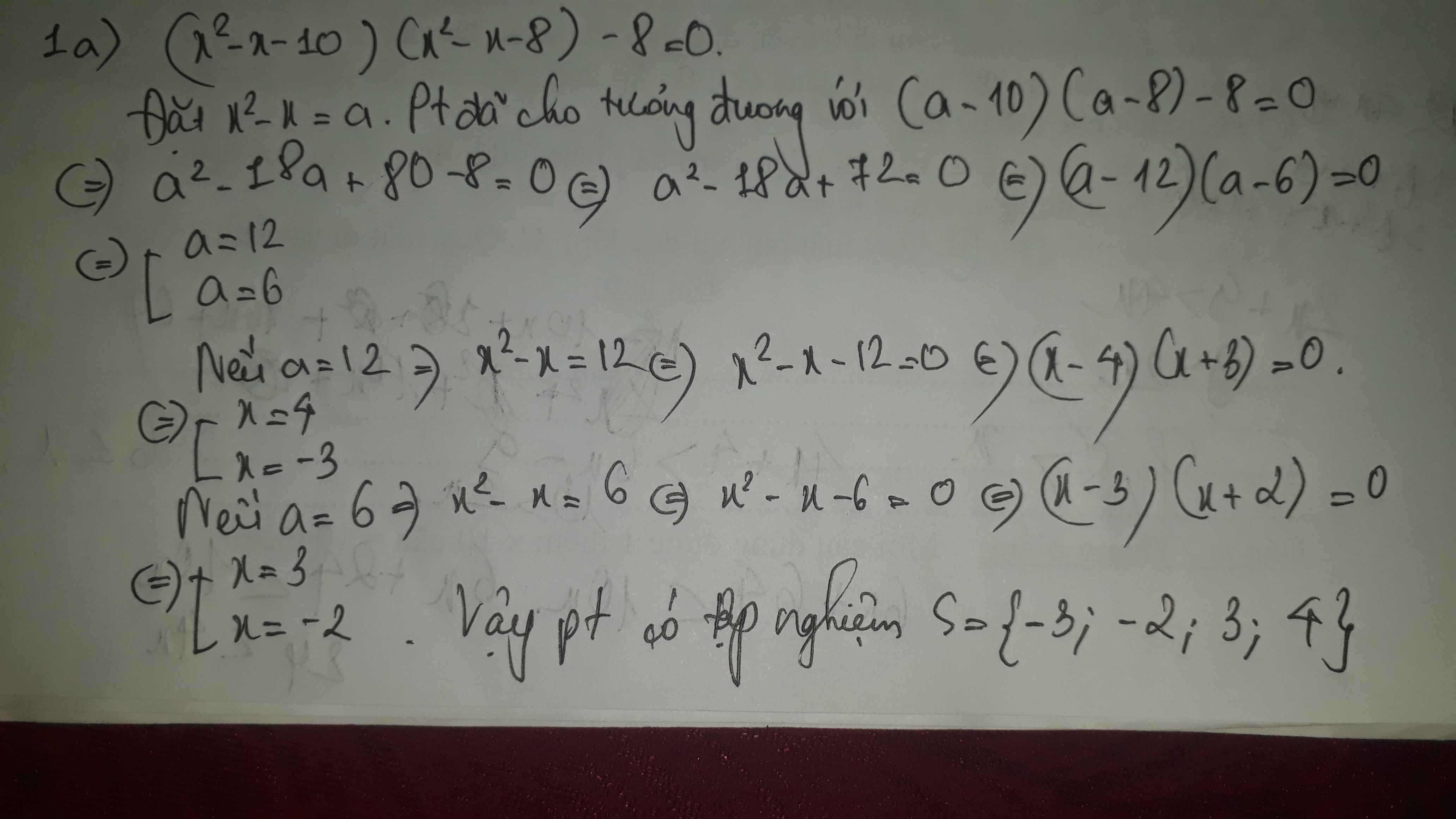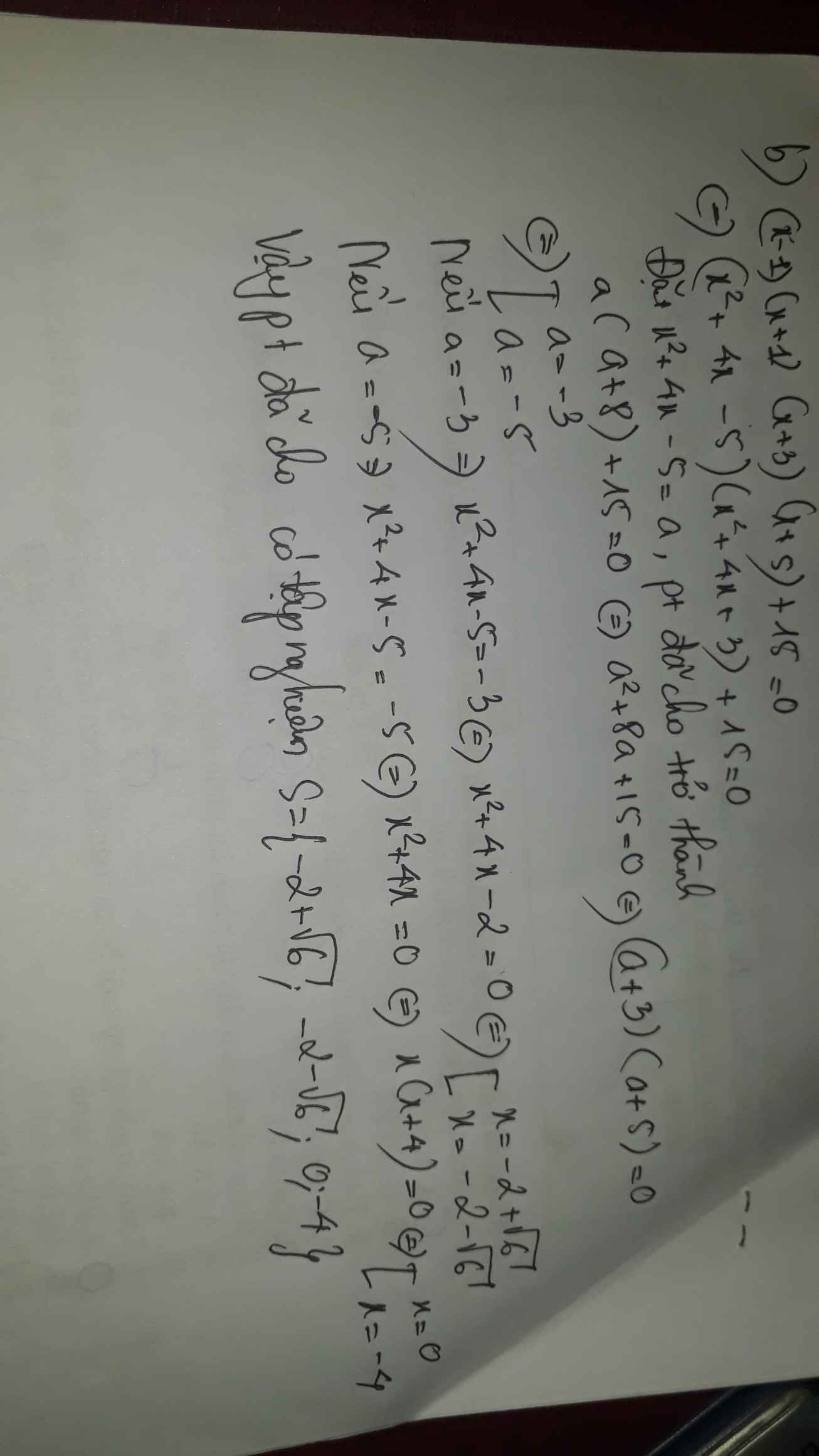Phương trình có số nghiệm nguyên âm là:
Hãy nhập câu hỏi của bạn vào đây, nếu là tài khoản VIP, bạn sẽ được ưu tiên trả lời.

a: Thay x=-1 và y=2 vào 2x-y+3, ta được:
\(2x-y+3=-2-2+3=-1< 0\)
=>(-1;2) không là nghiệm của bất phương trình 2x-y+3>0
b:
-x+2+2(y-2)<2(2-x)(1)
=>-x+2+2y-4<4-2x
=>-x+2y-2-4+2x<0
=>x+2y-6<0
Thay x=-1 và y=2 vào x+2y-6, ta được:
\(x+2y-6=-1+4-6=-3< 0\)
=>(-1;2) là nghiệm của bất phương trình (1)
c: Thay x=-1 và y=2 vào x-y-15, ta được:
\(x-y-15=-1-2-15=-18< 0\)
=>(-1;2) là nghiệm của bất phương trình x-y-15<0
d: 3(x-1)+4(y-2)<5x-3(2)
=>3x-3+4y-8<5x-3
=>3x+4y-11-5x+3<0
=>-2x+4y-8<0
=>x-2y+4>0
Khi x=-1 và y=2 thì \(x-2y+4=-1-4+4=-1< 0\)
=>(-1;2) không là nghiệm của bất phương trình (2)

Mình làm mẫu câu a nha
a, pt <=> ( x-2/7 - 1 ) + ( x-1/8 - 1 ) = ( x-4/5 - 1 ) + ( x-3/6 - 1 )
<=> x-9/7 + x-9/8 = x-9/5 + x-9/6
<=> x-9/5 + x-9/6 - x-9/7 - x-9/8 = 0
<=> (x-9).(1/5+1/6-1/9-1/8) = 0
<=> x-9 = 0 ( vì 1/5+1/6-1/9-1/8 > 0 )
<=> x = 9
Vậy x = 9
Tk mk nha

a) \(x^2-4x+4=25\\ \Rightarrow\left(x-2\right)^2=25\\ \Rightarrow\left[{}\begin{matrix}x-2=-5\\x-2=5\end{matrix}\right.\\ \Rightarrow\left[{}\begin{matrix}x=-3\\x=7\end{matrix}\right.\)
b) \(\left(5-2x\right)^2-16=0\\ \Rightarrow\left(5-2x\right)^2=16\\ \Rightarrow\left[{}\begin{matrix}5-2x=-4\\5-2x=4\end{matrix}\right.\\ \Rightarrow\left[{}\begin{matrix}x=4,5\\0,5\end{matrix}\right.\)
c) \(\left(x-3\right)^3-\left(x-3\right)\left(x^2+3x+9\right)+9\left(x+1\right)^2=15\\ \Rightarrow\left(x-3\right)^3-\left(x-3\right)^3+9\left(x+1\right)^2=15\\ \Rightarrow9\left(x+1\right)^2=15\\ \Rightarrow\left(x+1\right)^2=\dfrac{5}{3}\\ \Rightarrow\left[{}\begin{matrix}x+1=-\sqrt{\dfrac{5}{3}}\\x+1=\sqrt{\dfrac{5}{3}}\end{matrix}\right.\)
\(\Rightarrow\left[{}\begin{matrix}x=-\dfrac{3+\sqrt{15}}{3}\\x=\dfrac{-3+\sqrt{15}}{3}\end{matrix}\right.\)
a)\(\Leftrightarrow\)\(x^2-4x-21=0\)
\(\Leftrightarrow\)\(x^2-7x+3x-21=0\)
\(\Leftrightarrow\)\(x(x-7)+3(x-7)=0\)
\(\Leftrightarrow\)\((x-7)(x+3)=0\)
\(\Leftrightarrow\)\(\left[\begin{array}{} x=7\\ x=-3 \end{array} \right.\)
b)\(\Leftrightarrow\)\((5-2x)^2-4^2=0\)
\(\Leftrightarrow\)\((5-2x-4)(5-2x+4)=0\)
\(\Leftrightarrow\)\((-2x+1)(-2x+9)=0\)
\(\Leftrightarrow\)\(\left[\begin{array}{} x=\dfrac{1}{2}\\ x=\dfrac{9}{2} \end{array} \right.\)
giải phương trình:\(\frac{x^2+x}{x^2+3}+\frac{3x^2-x+15}{x^2+4}+\frac{x^2+x+2}{x^2+5}+x^3-3x^2+1=0\)


1) \(2\left(x+3\right)>5\left(x-1\right)+2\Leftrightarrow2x+6>5x-5+2\Leftrightarrow3x>9\Leftrightarrow x>3\)
2) \(x^2-x\left(x+2\right)>3x-10\)
\(\Leftrightarrow x^2-x^2-2x>3x-10\Leftrightarrow5x< 10\Leftrightarrow x< 2\)
3) \(x\left(x-5\right)< \left(x+1\right)^2\)
\(\Leftrightarrow x^2-5x< x^2+2x+1\Leftrightarrow7x>-1\Leftrightarrow x>-\dfrac{1}{7}\)
4) \(15-2\left(x-7\right)< 2\left(x-3\right)-6\)
\(\Leftrightarrow15-2x+14< 2x-6-6\Leftrightarrow4x>41\Leftrightarrow x>\dfrac{41}{4}\)
1: Ta có: \(2\left(x+3\right)>5\left(x-1\right)+2\)
\(\Leftrightarrow2x+6>5x-5+2\)
\(\Leftrightarrow-3x>-9\)
hay x<3
2: Ta có: \(x^2-x\left(x+2\right)>3x-10\)
\(\Leftrightarrow x^2-x^2-2x>3x-10\)
\(\Leftrightarrow-5x>-10\)
hay x<2
3: Ta có: \(x\left(x-5\right)\le\left(x+1\right)^2\)
\(\Leftrightarrow x^2-5x-x^2-2x-1\ge0\)
\(\Leftrightarrow-7x\ge1\)
hay \(x\le-\dfrac{1}{7}\)



Chọn C.